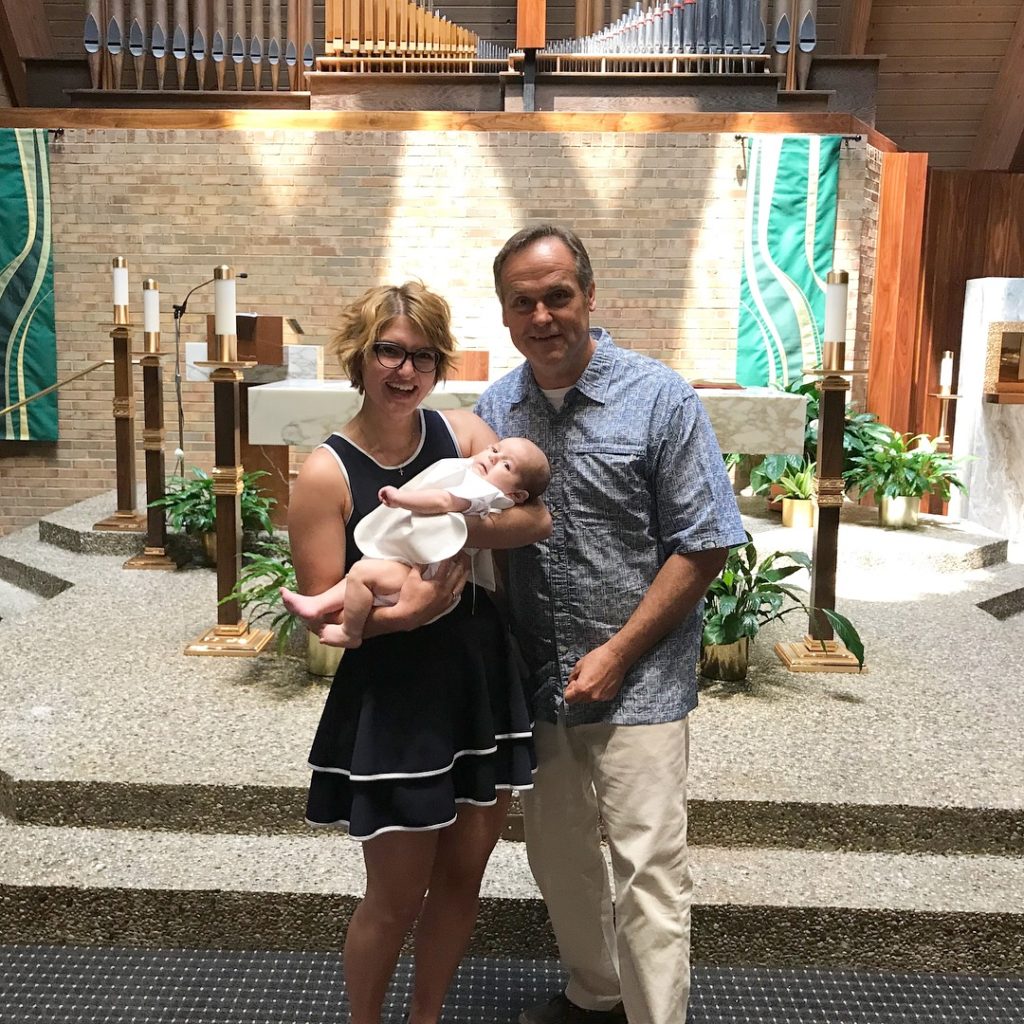Meghan Kozal, Senior Anchor Intern – Communications & Design
In this time of Valentine’s festivities, there is always a multiplicity of commercials advertising rings and ‘I do’ moments, so I wanted to take the time to share my own ‘I do’ moment. This summer in front of a church full of family, I said the words many dream of saying: ‘I do’. No, I am not talking about a wedding, but the Baptism of my godson.
I had the great privilege of becoming a godparent this summer and thus had the opportunity to respond ‘I do’ for my godson, Wyatt, during the renunciation of sin and profession of faith. In this part of the rite of Baptism, before the baby is baptized, the godparents and parents respond ‘I do’ to a series of statements of beliefs on behalf of the infant until they can confirm it themselves as an adult. If the person being baptized is an adult they themselves respond ‘I do’. These statements are heard at different points in the liturgical year as well, such as Easter or the Mass celebrating the Baptism of the Lord, where the congregation is invited to renew their Baptismal promises with an ‘I do’, though this time not necessarily in a white garment.

Since Wyatt’s Baptism this summer, I have been more aware of the actions in the sacrament of Baptism as I found myself an active participant in a new way. It is a sacrament that occurs fairly frequently within my home parish, as babies are baptized during the regular Mass times and paraded around the entire church to be fully welcomed by the congregation. This has allowed me to continue to say ‘I do’ alongside the parents and godparents, renewing my Baptismal promises throughout the year. In doing so frequently, I have had the time to reflect on the importance of the words to a greater extent.
I have long considered ‘I do’ to be the centerpiece of the wedding ceremony, whether religious or not, and had only considered the words to be an affirmation of the bond formed between the two individuals. However, as I have come to see the words ‘I do’ in many other contexts of the Catholic sacramental life, I am more aware of the reality that the ‘I do’ is not simply between the two individuals, but also with God through the seal of the Holy Spirit. This ‘I do’ is also a continuation of the ‘I do’ of Baptism, the sacrament in which we are “clothed with the wedding garment” (CCC 1244). Baptism is the “gateway to the Spirit” (CCC 1214) and then “in the epiclesis [the invocation of the Holy Spirit] of this sacrament [of Matrimony] the spouses receive the Holy Spirit as the communion of love of Christ and the Church. The Holy Spirit is the seal of their covenant” (CCC 1624).
Besides my own Baptism, I have also been dressed in white and said ‘I do [believe]’ in front of family and friends in another sacrament: my First Communion. Before receiving the Body or Blood of Christ during the Eucharist, the recipient responds with ‘Amen’, a word that states a confirmation of belief, in essence an ‘I do [believe]’. The first time this is said, girls are often in a white dress, and I even wore the veil that my mom had worn during her wedding and the cross necklace my grandmother had worn at hers. We are invited to say ‘I do’ at every Mass after this momentous occasion, even when we are not in white.
Although I had known that Matrimony was sacramental, as there is a non-religious version of the rite, its sacramentality has not been as apparent to me as that of Baptism or the Eucharist. In researching more about the connections between the three, I read a passage from the Catechism of the Catholic Church that describes how these three sacraments are interconnected. In this, the richness of the sacrament of Matrimony and its signs has become more apparent to me. The passage states: “The entire Christian life bears the mark of the spousal love of Christ and the Church. Already Baptism, the entry into the People of God, is a nuptial mystery; it is so to speak the nuptial bath which precedes the wedding feast, the Eucharist. Christian marriage in its turn becomes an efficacious sign, the sacrament of the covenant of Christ and the Church” (CCC 1617). The idea of a nuptial bath and the connection between Baptism and Matrimony can also be seen in Ephesians 5: 25-27 which states: “Husbands, love your wives, as Christ loved the church and gave himself up for her, that he might sanctify her, having cleansed her by the washing of water with the word, that he might present the church to himself in splendor, without spot or wrinkle or any such thing, that she might be holy and without blemish”. In this, Paul “teaches that baptism makes the Christian husband and wife members in the body of Christ… They have already been received into the mysterious union of Christ with His Church. As members of the bride of Christ they themselves are wedded to Christ; hence the mystery of the union of Christ and the Church is found in them also” (Scheeben 602).

The Catechism states furthermore that “the celebration of marriage between two Catholic faithful normally takes place during Holy Mass, because of the connection of all the sacraments with the Paschal mystery of Christ” (CCC 1621). The celebration of Matrimony within the context of Holy Mass is an element that I have often taken for granted, and sometimes considered unnecessary; however, it is a beautiful idea to me now that the first ‘feast’ that a newly married couple shares together is not the reception dinner, but the Eucharist, and that the white dress recalls the white garment received in Baptism.
I am sure I am only beginning to scratch the surface of the depths and interconnectedness of these three sacraments. That is perhaps the most beautiful thing of all, though; that these sacraments’ intricate mysteries will continue to unfold across my whole life, allowing me to continue to say ‘I do’.
—–
Catholic Church. Catechism of the Catholic Church. 2nd ed. Vatican: Libreria Editrice Vaticana, 2012. Print.
Scheeben, Matthais Joseph. The Mysteries of Christianity. Translated by: Cyril Vollert, S.J., B. Herder Book Co., 1951.